William Shakespeare needs no introduction. The Bard is maybe the most famous writer of all time, the playwright who redefined the English language and reinvented the modern narrative. His works have been watched, performed, and analyzed countless times in the interim 500 years since his death, yet shockingly little is known about the man himself.
Scholars have tried to uncover his life and motivations, and many have come up with their own theories and ideas about the man. Here are eight Shakespeare biographies that look at his story in very different ways.
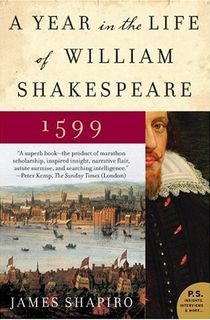
A Year in the Life of William Shakespeare: 1599
1599 was a pivotal year in English history and for Shakespeare. He wrote four of his most famous plays: Henry the Fifth, Julius Caesar, As You Like It, and, perhaps his magnum opus, Hamlet.
Queen Elizabeth I fought off the Spanish Armada, an Irish rebellion, and the pirates tracking the East India Company. As the Queen aged and remained without an heir, England waited with concern to find out who would succeed her as monarch. James Shapiro delves into a crucial year for the nation, as a new century beckoned and Shakespeare delved into his most political works.

Shakespeare, the King's Playwright: Theater in the Stuart Court, 1603-1613
After the death of Elizabeth I, King James VI of Scotland became James I of England. William Shakespeare, while still working in the public theater, became the royal playwright. He had to appease his new king and write plays that would satisfy his taste but also play well to the political landscape of the time.
Playwright and professor Alvin Kernan writes about Shakespeare as a political figure, a patronage playwright whose work during the Stuart era was sharply concerned with staying on the right side of a monarch whose right to rule was built on shaky foundations. This, he argues, can be seen in works like King Lear, which is concerned with the divine rights of the monarch, and in Coriolanus, a story of the aristocracy's troubles in the face of major change.
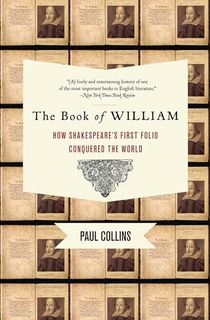
The Book of William: How Shakespeare's First Folio Conquered the World
The First Folio, also known as Mr. William Shakespeare's Comedies, Histories, & Tragedies is a collection of plays first published seven years after Shakespeare's death. It's considered by scholars to be the only reliable text for about 20 of his plays.
It is thought that only 750 or so copies were printed, and only 235 are known to exist in the 21st century. So, of course, the Folio is obsessed over by rare book collectors. Paul Collins explores the origins of this collection, how it influenced centuries’ worth of English literature, and why collectors are determined to own a piece of history.
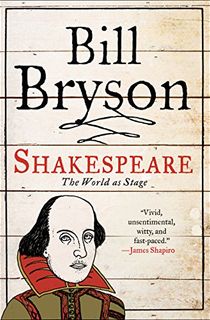
Shakespeare: The World as Stage
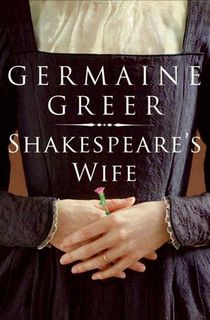
Shakespeare's Wife
While little is known about Shakespeare's day-to-day life, even less is known about his wife, Ann Hathaway. The omission of her name from Shakespeare's will has been interpreted as evidence that she was unimportant to his life and work. This means there is little to no serious critical scholarship on Hathaway's life. How did she become the wife of the most important writer in the English language?
Feminist writer Germaine Greer decided to rectify this with Shakespeare’s Life, an examination both of Hathaway’s life and of the circumstances that made it too easy for her to be erased from history.
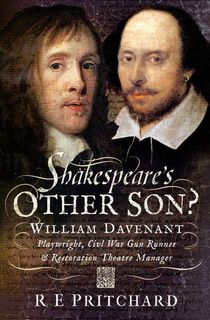
Shakespeare's Other Son?
Sir William Davenant was widely known as “Davenant the Poet,” a writer for the court of King Charles I who went on to replace Ben Jonson as Poet Laureate. He wrote plays, was beloved by the King, and lost his nose to mercury treatment for an STD. He was sent off to America to colonize Virginia by Charles II but was captured by the rival Parliamentarians and imprisoned for five years.
On top of his own work and fame, it was rumored for centuries that Davenant was secretly the biological son of Shakespeare. Even if this isn't true, it is notable that Davenant's work as a stage manager helped to keep Shakespeare's plays alive during the Restoration era. R.E. Pritchard offers a biography of an artistic heir to the Bard.
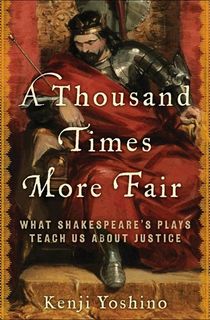
A Thousand Times More Fair
Can the Bard's plays tell us anything about justice and politics in the 21st century? Celebrated law professor and author Kenji Yoshino delves into ten of the most important works of Shakespeare and uses them to explore ethical issues of our modern day lives.
These plays take on everything from property rights to marriage contracts to the fallout of war and murder. Yoshino uses Shakespeare as a lens for contemporary ideas, exploring defining events of our times with wit and legal know-how.
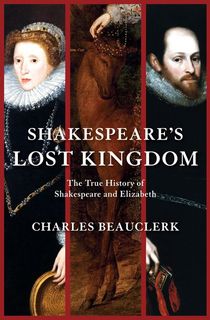
Shakespeare's Lost Kingdom
Charles Beauclerk, the Earl of Burford, is one of the most prominent figures in the controversial Oxfordian theory of Shakespeare authorship. This conspiracy contends that Shakespeare didn't write any of his plays and that the true Bard was Edward De Vere, the Earl of Oxford.
In 2010 he published Shakespeare's Lost Kingdom as a way to further explain his theory. In it, he claims that Oxford was not only the true genius behind Shakespeare's plays but the lover of Queen Elizabeth I, the father of one of her bastard kids, AND her illegitimate son. None of this is true, by the way.




